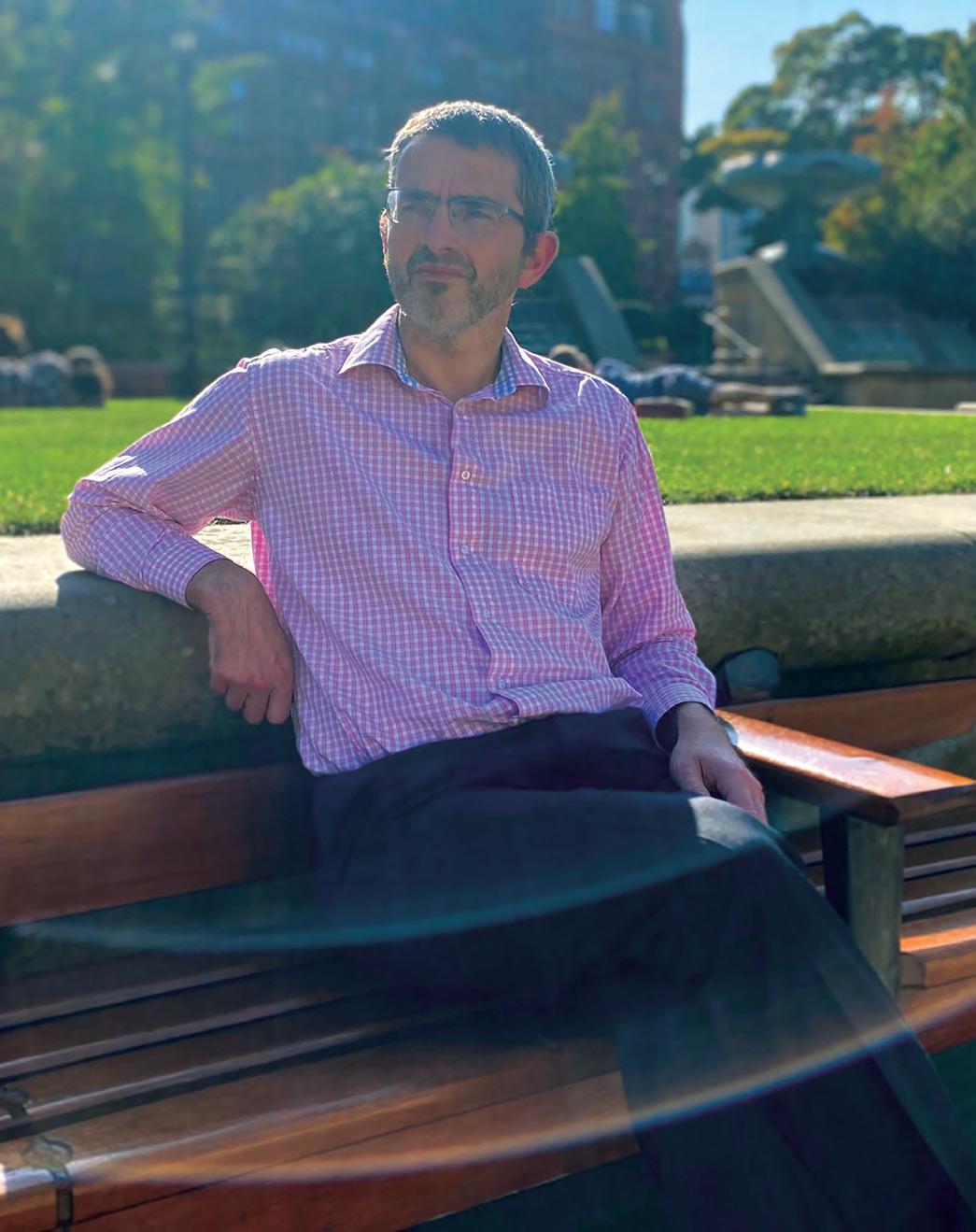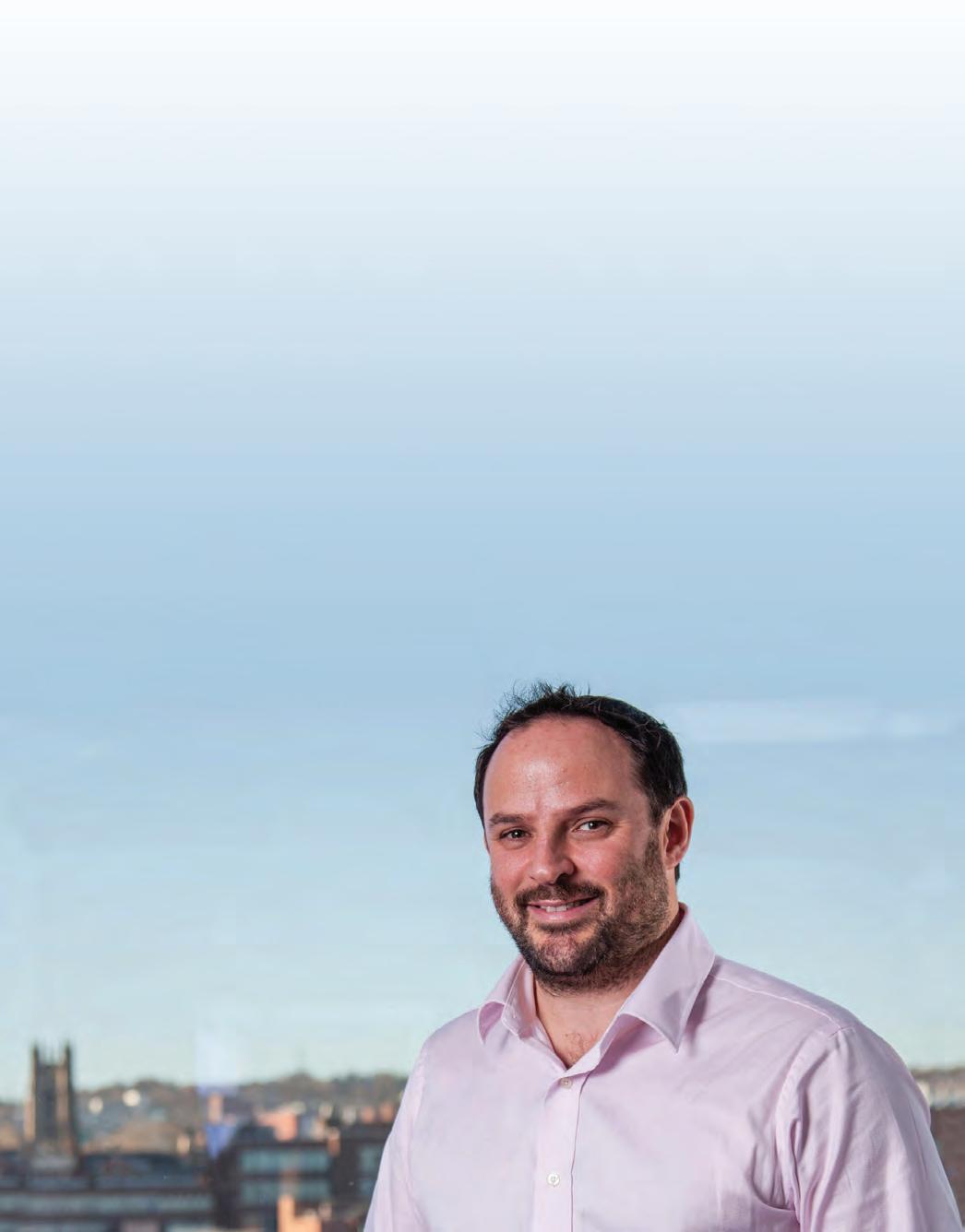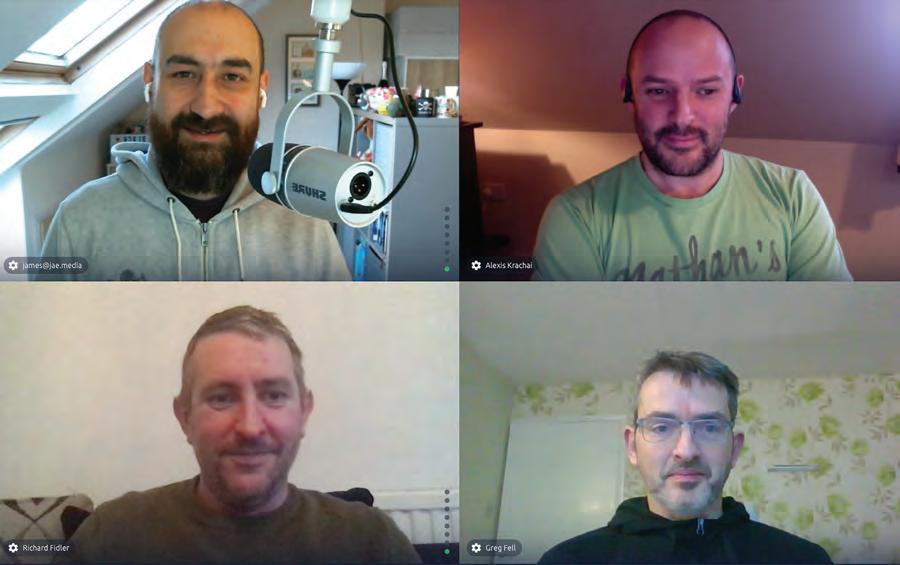
12 minute read
Cover story
THE ROAD TO RECOVERY
As the UK works through the third national lockdown Greg Fell, director of Public Health in Sheffield and Alexis Krachai, Sheffield Chamber of Commerce interim executive director and managing director of Counter Context, discussed the optimism of the vaccine rollout, the changes needed to the help available for businesses, and how the resilience of the Sheffield City Region business community. Words by Jill Theobald
Advertisement
“It is in all our interests to manage the virus spread best we can – in the long term and in the way we run our lives and businesses – because the notion of COVID secure will be with us for long time to come, I think.”
Talking to Greg Fell in January as the UK entered its third national lockdown, there are probably not many employers or employees across the Sheffield City Region (SCR) who would be surprised to discover the Director of Public Health in Sheffield does not sugarcoat his predictions. “2020 was quite a difficult year – that’s an understatement, and 2021 will be bumpy no doubt about that. Lots of people want me to predict when it will be over. I don’t think it will be over in 2021 – that’s the honest answer.” However, he is also cautiously optimistic about the vaccine rollout – and the third lockdown coming to an end – and pays credit to businesses across the SCR who have responded by ‘adapting and pivoting’ the best they can. “We will come out of this third wave and the third lockdown and that will be quite a slowly declining tail. By that time, we will have a pretty well vaccinated population as well and that will have an impact, no doubt – and there will be caveats on that – but we’ll be no way near a scenario where the whole population is immune. “There will still be susceptible people, so we are going to have to manage the impact of coronavirus probably for the foreseeable future. I’d like to say we could eliminate it but sadly that ship has been and gone – I think we will be in a bumpy place for at least a year would be my guess.” Bumpy – or ‘turbulent’ as Alexis Krachai, Sheffield Chamber of Commerce Interim Executive Director, views 2021. But the MD of Counter Context also describes himself as an optimist and sure enough does see some rays of light as we head into the new year, too. “It will be turbulent, but we shouldn’t be worried or intimidated by that,” he says. “If we were to describe 2020 as a dark and challenging year, this year I think will be lighter but not plain sailing as we are not going to move swiftly beyond this pandemic. “So we’re going to have to show resilience and carry on innovating and as a business community be agile and be prepared for ups and downs. Overall, the trajectory will be more positive than perhaps we expect but I think 2021 will be better than 2020.” Both Greg and Alexis agree that until the enquiries start, not just here but around the world, we won’t know which countries’ approaches

GREG FELL, DIRECTOR OF PUBLIC HEALTH IN SHEFFIELD
to tackling COVID were successful. “But the countries that went hard and early will probably prove to be the most effective,” says Alex, adding that we need to, “on a global scale look quite profoundly at those countries that have solidarity at winning their populations and an economy and a public health system that can lockdown very quickly with a high degree of adherence. It’s going hard and early, but we found that very difficult to do for a lot of different political, economic and social reasons and in a lot of European countries that was exacerbated the same.” Said Greg: “There’s one sure fire way to suppress viral transmissions and that’s to lock the economy down completely – that will have a massive positive effect but also a massive negative effect for all the reasons Alexis has set out. So we have to pursue a fine line between limiting the social and economic harm that suppression strategies have versus maximising the suppression strategy.” He is also full of praise for 85-90 per cent are micro businesses, so yes, they have the ability to be agile, but they perhaps don’t have the resilience and cashflows to trade through really complex economic situations.” Greg said: “I may be wrong, but I believe there’s a case that economy in South Yorkshire is arguably less reliant on leisure and tourism etc than other parts of the country so we could make a case that we’ve been less impacted. But we HAVE been impacted and we can do better in terms of business support, no two ways about it.” Alexis describes the support since March 2020 as the government using ‘a huge hose pipe and sprayed money all over economy not necessarily in a panic but that was what was needed’ with Bounceback loans and CIBILs. In subsequent lockdowns, he says, the Treasury are trying to be ‘more nuanced, sophisticated and measured’. “But they haven’t got it right because the economy is incredibly complicated, and we live in a centralised state so what we’re seeing now is, in simple terms, business support is either not enough – and can never be because you can’t replace a fully open economy – but the support that is being provided is being clumsily administered. And that’s not a reflection on local authorities like the city council, the local authorities in Barnsley, Rotherham and Doncaster or the Sheffield City Region but it’s government recognising or making it a political decision that it can’t keep hosing money into the economy the way it did before.” Alexis added: “Businesses are going to have to keep adapting and innovating and we must keep pressure on for support for those that, however smart and thoughtful their owners and staff are, will not be able to trade in a pandemic.”

businesses in our region who have, as Alexis describes it ‘pivoted and adapted’ to COVID. “All credit to businesses up and down SCR who moved mountains to do that the best they possibly can but some are more reliant on face-to-face contact with customers or between individual employees so that will be harder for some than others.” Alexis said: “All of us at a personal level mourn every job loss or every headline about a business that has failed. But some businesses are doing extremely well because their business models were not predicated on close contact between humans. “In the SCR and Sheffield in particular we have a genuinely proud history of being at the forefront of innovation – we’ve been doing it for 3-400 years so there’s been a lot of innovation in marketplace. But equally, and without doubt, there is a lot of pain in the business community, the marketplace, and the economy. Like most places in the UK, we are a city region of small businesses,
Greg and Alexis were talking to James Marriott during unLTD’s first podcast episode, which is available through all your usual podcast providers. For the full discussion search ‘unLTD business’.




BRAVE NEW WORLD
Alexis Krachai on learning lessons about the accelerating trend of the ‘low touch economy’ during the pandemic – and beyond
“I was sent a report by a company in North America about what they defined as the ‘Low Touch Economy’ and it really resonated with me. I think it’s going to define the rest of our professional lives.
“It’s defined as being shaped by reduced human contact and tighter restrictions locally, nationally and internationally and I think we will have to get used to the idea we’re all going to live and operate in a low touch economy. “It’s the acceleration of preexisting trends – more of our lives being lived online, and more products and services being consumed in our homes where possible. We will likely see an explosion in mental health issues and how people think about their wellbeing and products and services being developed – and indeed they already are – to address that. We will be more focused as a society and businesses will respond in kind on hygiene and cleanliness. “When we eventually talk about COVID-19 in the past tense we are still going to be carrying the kind of mental scars of having lived through it. I’m an optimist and I think we will have hopefully learned from this experience at a structural level. “We will become a lot more sensitive to any little blip of an unknown pathogen and really focused in the western world on public health surveillance. It will start to permeate mainstream news and become more of a topic of conversation because we are now tuned into it. When we get back into pubs – which we will! – we will be talking about football scores as well as ‘have you heard about what’s popped up in South East Asia or Africa’ – that will be far more prevalent.”
Alexis on how the region will ‘thrive’ post-Brexit
“It’s a brave new world. In 2016 we voted to leave the EU and the political decision stemmed from that was for us to leave the EU Single Market and the Customs Union. That, in very practical terms, has involved us ripping away from the trading arrangements for our largest market for our exports that we’ve got used to over the last 30 to 40 years. “My message to businesses in SCR is I understand the pain that’s prompted some businesses and the frustration with the additional paperwork that has been generated. It may be that there are businesses out there that can see and are enjoying new opportunities as a result of Brexit so there is good and bad news associated with a very profound political decision. “Regardless of my views on Brexit good or bad, one of the things worth noting is that in Sheffield and SCR we’ve been trading with the wider world for centuries – long before the EU was the gleam in the eye of political leaders after the Second World War. “So, we will thrive in simple and succinct terms. It is a huge change leaving Single Market and Customs Union been in for 40 years, but we’ll carry on doing what we’ve been doing in Sheffield and the wider city region which is making amazing things that people want to buy.
We will carry on being successful because that is what we do. Businesses are very good at adapting and by and large very good at learning and spotting opportunities – we did that in the EU and we’ll do it outside.”


JAMES MARRIOTT, ALEXIS KRACHAI, RICHARD FIDLER AND GREG FELL DURING THE RECORDING OF THE FIRST UNLTD PODCAST

Greg Fell shares his views on some of the key areas of the virus, its impact, and the third lockdown ‘flashpoints’
Greg on … herd immunity and vaccination
There’s zero evidence that we can effectively shield the very vulnerable and the very elderly just because of the way society works. You can if you want to lock them away, but no one wants to do that – we all want to see our gran, so there’s no way we can operationally affect a shielding policy. The only way to develop herd immunity is to develop a vaccine – we have that now and we are going at some considerable pace on that. It will take a while for us all to be vaccinated but the best way for us to develop herd immunity with any infectious diseases is through vaccination.
Greg on … global lessons
We’re a libertarian economy and that brings benefits for all sorts of reasons, but we’ve seen some of the downsides, too. Lots of South East Asia benefited from having direct experience of SARS first time round. We hadn’t been through that and hadn’t learned those lessons as a society. Global learning will be important from this. While it is fair to say the UK has not had a great response, we’re in a big club – a lot of the world hasn’t, while some countries have had a spectacularly good response. There are things have worked well for us and there are plenty of things that have not worked so well.
Greg on … lockdown three being ‘more lax’
The rules are less strict than last time, but the rules are being enforced, there’s no two ways about that – if the police and Environmental Health see people obviously breaking rules they will enforce the law. The media is full of a narrative of ‘everyone is breaking the rules’ but the evidence is actually to the contrary. The vast majority are observing the rules but where rules are allowing something to happen, people will do it – if retail is open people will go shopping. So while the rules are a little more lax compared with first time round and that makes it harder to control the spread of the virus, most people are observing the rules that are there.
Greg on … lockdown ‘flashpoints’
The key flashpoint around rule observance is people who can’t afford to isolate for 14 days. It’s alright for me, I can sit in my back bedroom for another nine months, thank you very much. But if I drive a taxi and I have four kids to feed £500 a fortnight is not enough. Another strong narrative in the media is that those on low wages and insecure contracts can’t afford to observe the rules in the same way I can and there’s more that needs to be done in those terms. That’s the single most important thing by far in terms of suppressing the viral spread.













